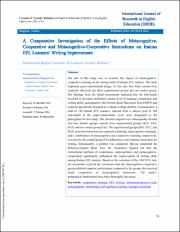| dc.contributor.author | Sheikhy Behdani, Reihaneh | en_US |
| dc.contributor.author | foroutan, mohammad bagher | en_US |
| dc.date.accessioned | 1403-04-20T01:16:15Z | fa_IR |
| dc.date.accessioned | 2024-07-10T01:16:20Z | |
| dc.date.available | 1403-04-20T01:16:15Z | fa_IR |
| dc.date.available | 2024-07-10T01:16:20Z | |
| dc.date.issued | 2024-03-01 | en_US |
| dc.date.issued | 1402-12-11 | fa_IR |
| dc.identifier.citation | Sheikhy Behdani, Reihaneh, foroutan, mohammad bagher. (2024). A Comparative Investigation of the Effects of Metacognitive, Cooperative and Metacognitive-Cooperative Instructions on Iranian EFL Learners’ Writing Improvement. International Journal of Research in English Education, 9(1), 70-83. | en_US |
| dc.identifier.issn | 2538-4015 | |
| dc.identifier.issn | 2538-3027 | |
| dc.identifier.uri | http://ijreeonline.com/article-1-872-en.html | |
| dc.identifier.uri | https://iranjournals.nlai.ir/handle/123456789/1095835 | |
| dc.description.abstract | The aim of this study was to examine the impact of metacognitive-cooperative training on the writing skills of Iranian EFL learners. The study employed quasi-experimental design. To this aim, four intact classes were randomly allocated into three experimental groups and one control group. The findings from the initial assessments indicated that the individuals involved in the study exhibited a similar level of language competence and writing skills, ascertained by the Oxford Quick Placement Test (OQPT) and a pretest specifically designed to evaluate writing abilities. Consequently, a total of 120 Iranian EFL learners, selected from a subject pool of 160 individuals at the upper-intermediate level, were designated as the participants for this study. The selected subjects were subsequently divided into four distinct groups, namely three experimental groups (EG1, EG2, EG3) and one control group (CG). The experimental groups (EG1, EG2, and EG3) received instruction on cooperative learning, metacognitive strategies, and a combination of metacognitive and cooperative learning, respectively. Conversely, the control group (CG) adhered to a conventional curriculum for writing. Subsequently, a posttest was conducted. Having conducted the Wilcoxon-Signed Rank Test, the researchers figured out that the instructional methods of cooperation, metacognition, and metacognitive-cooperation significantly influenced the improvement of writing skills among Iranian EFL learners. Based on the outcomes of the ANCOVA test, the researchers reached the conclusion that the metacognitive-cooperative group exhibited superior performance compared to the groups that received solely cooperative or metacognitive instruction. The study’s pedagogical implications have been thoroughly discussed.
| en_US |
| dc.format.extent | 565 | |
| dc.format.mimetype | application/pdf | |
| dc.language | English | |
| dc.language.iso | en_US | |
| dc.relation.ispartof | International Journal of Research in English Education | en_US |
| dc.subject | cooperative learning | en_US |
| dc.subject | EFL writing | en_US |
| dc.subject | information-process load | en_US |
| dc.subject | metacognition | en_US |
| dc.subject | monitoring | en_US |
| dc.subject | self-regulated learning | en_US |
| dc.subject | strategic reasoning | en_US |
| dc.subject | Special | en_US |
| dc.title | A Comparative Investigation of the Effects of Metacognitive, Cooperative and Metacognitive-Cooperative Instructions on Iranian EFL Learners’ Writing Improvement | en_US |
| dc.type | Text | en_US |
| dc.type | Research | en_US |
| dc.contributor.department | Department of English Translation, Lahijan Branch, Islamic Azad University, Lahijan, Iran | en_US |
| dc.contributor.department | Department of English Translation, Lahijan Branch, Islamic Azad University, Lahijan, Iran | en_US |
| dc.citation.volume | 9 | |
| dc.citation.issue | 1 | |
| dc.citation.spage | 70 | |
| dc.citation.epage | 83 | |





